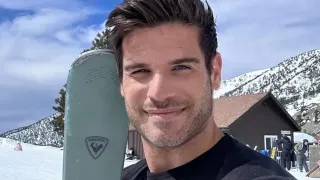October 29, 2021
'The Lehman Trilogy' Brings an Epic Tale of Capitalism to Broadway
Matthew Wexler READ TIME: 4 MIN.
Deep into the third act of Stefano Massini's "The Lehman Trilogy," an epic exploration of capitalism through the lens of – at one time – one of America's most powerful financial families, Bobby Lehman dances atop a table, doing the Twist at a wretched pace until the movement consumes him and he collapses into a contorted ball. It is the end of an era as his heirs enter the final chapter of a 158-year legacy that so famously imploded in 2008 amid the subprime mortgage crisis. If that sounds like a lot to take in for a night at the theater, fasten your seatbelts because it's going to be a bumpy night.
Massini's sweeping narrative, mostly told through direct storytelling to the audience and punctuated with laser-sharp character studies by its three leading men (Simon Russell Beale, Adam Godley, and Adrian Lester as the triumphant trifecta), is both intimate and societal. Henry Lehman (named Heyum Lehmann in Bavaria, Germany) arrived first in 1844, followed by his brothers Emanuel and Mayer, to pursue the American Dream that had yet to be written.
A revolving, transparent box designed by Ed Devlin, likely referencing the company's final midtown Manhattan headquarters, contains the action as if it were a laboratory experiment – its players rat-like in Katrina Lindsay's stark 19th-century menswear. Downstage left at audience level, a pianist (Candida Caldicot) plucks out Nick Powell's original score, supplemented by popular music, sound effects, and an imposing cyclorama featuring Luke Halls' monochromatic video design. The result is a squeamish convergence of past and present. Glass and steel softened by words as enveloping as organic cotton.
It was cotton, after all, that first launched the Lehman brothers' success. They sold it, brokered it, and eventually, "the Gold of the South" became their gold – built on the backs of slaves. Their business even survived a cataclysmic industry collapse during the Civil War, despite a local doctor's acute observation:
"Everything that was built here
was built on a crime.
The roots run so deep you cannot see them
but the ground beneath our feet is poisoned.
It had to end this way."
But it didn't end for the Lehman brothers. Nor did the 1929 stock market crash do them in, guided at this point by Phillip's son (the aforementioned Bobby, finding his footing like the young thoroughbreds he owned and raced). The strategy: let other banks fail first. "If they ask for loans, we should say no...if we can survive the first month [the state] won't let us fail."
Bobby's cutthroat approach worked. Until it didn't. As a financial services firm, Lehman Brothers pivoted with the times, using marketing to convince consumers (and board members) that "only those who buy will win the war. And since we're all at war, all the time, then only those who buy, survive."
If it seems like a lot of names and transactions to keep track of, it is. Enter director Sam Mendes to acutely guide his actors through the dozens of character transformations with the flip of a collar or fluttering waistcoat. Their collective mastery of voice and movement holds the excitement of a stock's IPO date (if you're into that sort of thing). The audience becomes those early investors, waiting with bated breath to see what unfolds next.
The narrative points an arthritic finger at Lewis Glucksman to exemplify the next generation of outsiders who also unmercifully wanted a piece of the pie. He rose from the trading floor to co-CEO, pushing Pete Peterson out for the top spot, though his tenure, too, was short.
With so much ground to cover, some of the larger cultural implications of the brother's endeavors are left on the trading room floor. While attention is paid to several stockbrokers who committed suicide amid the 1929 crash, beyond the previously mentioned line, little is said of the slave trade and systemic racism on which the company was initially built. Nor is it clear if the trio of Jews and their heirs ever experienced antisemitism, leaving the audience to believe that no obstacle is too great in the pursuit of power and money.
Yet, the denouement – Lehman Brothers' 2008 bankruptcy – was inevitable. History has shown us that the mighty always fall.
"They were all invincible. Until they weren't."
Lesson learned? Likely not. History has a way of inconveniently repeating itself, including on Broadway, where, eight times a week, the Lehman brothers can, once again, rise and fall.
"The Lehman Trilogy"
Nederlander Theatre
208 West 41st Street, NYC
Through January 2, 2022






